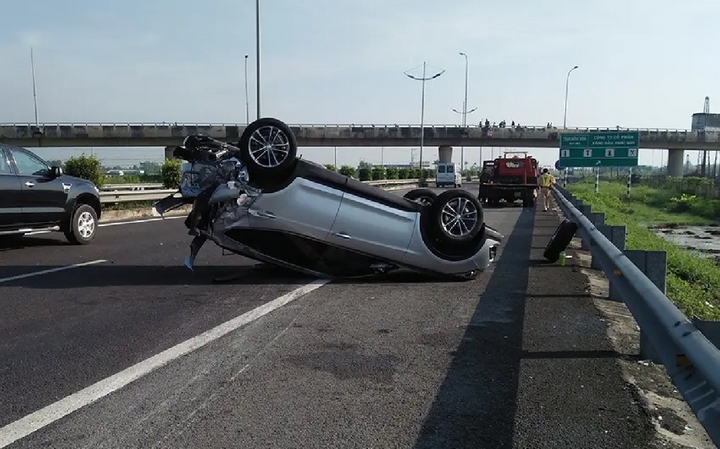There are several fundamental reasons why cars are prone to rolling over when on the road.
Road Conditions
Uneven, bumpy, or inclined roads with sharp turns can cause rollovers. When a car travels on such roads, its center of gravity may shift, increasing the likelihood of a rollover.
Wet and slippery roads are also hazardous, as they can cause tires to lose traction, leading to potential rollovers.
Speeding
Excessive speed is a primary cause of traffic accidents, including rollovers. When driving above the speed limit, drivers may find it challenging to control the vehicle, react to sudden obstacles, or brake effectively, increasing the risk of a rollover.

(Illustrative image)
Bad Habits While Driving
Listening to loud music or talking on the phone while driving can lead to a loss of focus and reduced reaction time in emergency situations.
This highlights the critical role of the driver. Most accidents stem from driver inattention, lack of observation, overconfidence, speeding, and driving under the influence of alcohol…
Substance Use and Alcohol Consumption While Driving
Driving under the influence of stimulants or alcohol is extremely dangerous and can lead to rollovers. When a driver is impaired, their ability to handle unexpected situations diminishes, making it more challenging to keep the car stable and preventing rollovers.
Impaired drivers are more likely to break traffic rules and exhibit reckless behavior, such as sudden acceleration or erratic driving, endangering those around them. Loss of control while driving can have severe consequences and lead to accidents with regrettable outcomes.
Tire Issues
Tire skidding is another factor that can contribute to rollovers. When a tire blows out or goes flat, the driver may struggle to control the vehicle, creating a dangerous situation that could result in an accident.
To ensure safety, car owners should regularly inspect their tires. If a tire is damaged or excessively worn, it should be replaced immediately.
Vehicle Characteristics
The risk of a rollover is influenced not only by the type of vehicle but also by its center of gravity. While any vehicle can roll over, those with a higher center of gravity are generally more susceptible.
Vehicles with a higher center of gravity, such as SUVs, pickup trucks, and MPVs, tend to be larger and heavier. As a result, their center of gravity is elevated, making them more prone to rollovers when navigating complex terrain, heavy traffic, or sharp turns.
According to VTC News
































